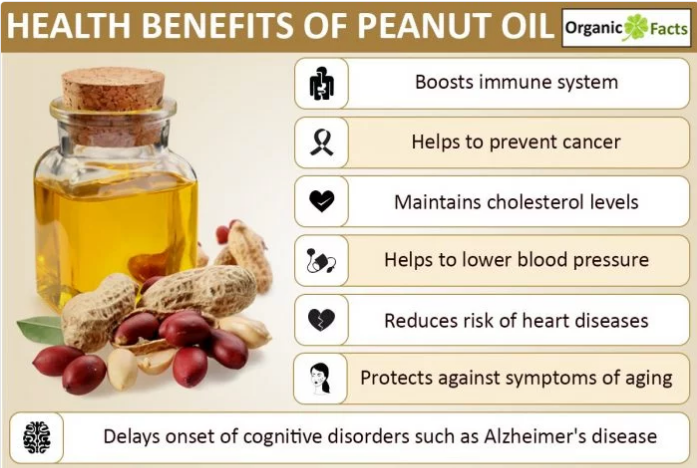What is Cold Pressed Peanut Oil?
Extracting oils from seeds, fruits, vegetables, and nuts involve crushing them and forcing oil out. The quality of the oil you use, to a large extent, depends on the process through which it is extracted. There are basically two types of oils based on the process of extraction: cold pressed oils and heat pressed oils. In the heat-based extraction process, the heat involved in the process can reduce the nutritional value, flavor and aroma of the oil.
Peanut oil, also known as groundnut oil is a rich vegetable oil commonly used in cooking that is derived from peanuts. It comes in a number of varieties, including refined, unrefined, roasted, and cold-pressed, which have slight differences in their nutritional value and health benefits. Generally, people use cold-pressed peanut oil (particularly unrefined) in their cooking for the pleasant flavor that it gives, and it is healthier than other types of oil.

Health Benefits of Peanut Oil
Let’s take a closer look at some of the impressive health benefits of this delicious cooking oil.
Boosts Immune System
Adding peanut oil to your diet can keep you healthy by stimulating your white blood cell production to defend off any foreign agents in your body.
Anti-cancer Potential
There has been a lot of debate on the potential of nutritional components of nuts in cancer prevention. In a report published in the Journal of Food Science and Technology, (2016) studies suggest that unsaturated fats and bioactive compounds in peanuts have cancer-preventive effects. Many Researchers have proved that peanut oil contained phytosterols and in particular beta-sitosterol, which may have the ability to protect the body from colon, prostate, and breast cancer.
Controls Cholesterol Levels
Peanut oil is cholesterol free, which is one of the major factors contributing to complicated heart conditions such as atherosclerosis. Since cooking oil is used in many different ways, eliminating this dangerous cholesterol from your body can help prevent a variety of health complications. Furthermore, not only does peanut oil lack cholesterol, it can reduce your current levels of cholesterol due to the presence of plant sterols. These phytosterols actually compete for cholesterol absorption in the stomach and gut, which can lower your cholesterol levels by 10-15%!
Boosts Heart Health
Peanut oil also offers many health benefits because it is rich in monounsaturated fatty acid content (oleic acid), which helps lower your bad cholesterol level and increase your good cholesterol levels called HDL, in the blood. This beneficial cholesterol actually helps to prevent heart diseases like coronary artery disease, atherosclerosis, heart attacks and strokes
Peanut oil is cholesterol free, which is one of the major factors contributing to complicated heart conditions such as atherosclerosis. Since cooking oil is used in many different ways, eliminating this dangerous cholesterol from your body can help prevent a variety of health complications. Furthermore, not only does peanut oil lack cholesterol, it can reduce your current levels of cholesterol due to the presence of plant sterols. These phytosterols actually compete for cholesterol absorption in the stomach and gut, which can lower your cholesterol levels by 10-15%!
Boosts Heart Health
Peanut oil also contains monounsaturated fatty acids, like oleic acid, which increase the levels of “good cholesterol”, called HDL, in the blood. This beneficial cholesterol actually helps to scrape off and reduce bad cholesterol (LDL) and lower your risk of developing coronary heart diseases and strokes.
Anti-cancer Potential
There has been a lot of debate on the potential of nutritional components of nuts in cancer prevention. In a report published in the Journal of Food Science and Technology, (2016) studies suggest that unsaturated fats and bioactive compounds in peanuts have cancer-preventive effects. Many Researchers have proved that peanut oil contained phytosterols and in particular beta-sitosterol, which may have the ability to protect the body from colon, prostate, and breast cancer.
Lowers Blood Pressure
Resveratrol interacts with various hormones that affect blood vessels, like angiotensin, which constricts vessels and arteries. By neutralizing the effects of that hormone, resveratrol helps to decrease blood pressure, which reduces stress on the cardiovascular system.
